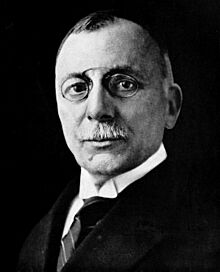Ante Trumbić facts for kids
Quick facts for kids
Ante Trumbić
|
|
|---|---|
 |
|
| Foreign Minister of Yugoslavia | |
| In office 7 December 1918 – 22 November 1920 |
|
| Preceded by | Stojan Protić |
| Succeeded by | Milenko Vesnić |
| 23rd Mayor of Split | |
| In office 1906–1907 |
|
| Preceded by | Vinko Milić |
| Succeeded by | Vicko Mihaljević |
| Personal details | |
| Born | 17 May 1864 Split, Kingdom of Dalmatia, Austrian Empire |
| Died | 17 November 1938 (aged 74) Zagreb, Kingdom of Yugoslavia |
| Political party | Croatian Party of Rights (–1905) Croatian Party (1905–1918) Croatian Community (1924–1926) Croatian Peasant Party (1926–1938) |
| Alma mater | University of Zagreb University of Vienna |
| Occupation | Politician |
| Profession | Attorney at law |
Ante Trumbić (born May 17, 1864 – died November 17, 1938) was an important Croatian lawyer and politician in the early 1900s. He played a big role in creating the country of Yugoslavia.
Contents
A Young Politician
Ante Trumbić was born in Split, a city that was part of the Austrian Empire back then. He studied law in different cities like Zagreb, Vienna, and Graz. He became a lawyer and later, in 1905, he became the mayor of Split.
Trumbić believed in making changes in the parts of Austria-Hungary where Slavic people lived. He wanted to unite Dalmatia with Croatia-Slavonia. He even helped write the Rijeka Resolution, which asked for this unification.
World War I and Yugoslavia
During World War I, after the assassination in Sarajevo of Archduke Franz Ferdinand, Trumbić became a key leader for Yugoslav unity. He led a group called the Yugoslav Committee. This group worked to convince the Allies (countries fighting against Austria-Hungary) to support the idea of an independent Yugoslavia.
Trumbić talked with Serbian Prime Minister Nikola Pašić. They agreed to create a united country for Serbs, Croats, and Slovenes. This agreement was called the Corfu Declaration and happened on July 20, 1917. The new country would be led by the Serbian House of Karađorđević. Trumbić also led the Yugoslav Committee at the conference in 1918 that created the Geneva Declaration.
After the War
In 1918, Trumbić became the first foreign minister of the new Kingdom of Serbs, Croats and Slovenes. After World War I, at the Versailles conference, he had to speak up for Yugoslavia. He worked to protect Yugoslavia's land from Italy's wishes to take parts of Dalmatia.
Later Disagreements
Even though he helped create Yugoslavia, Trumbić later disagreed with the 1921 constitution. He felt it gave too much power to the central government and to the Serbs. He was one of 35 representatives who voted against it.
Over time, Trumbić became more and more unhappy with the Yugoslav government. He felt it was too much controlled by Serbs. He was elected to parliament one last time in 1927. He represented Zagreb as part of the Croatian Bloc.
Royal Dictatorship
In 1929, King Alexander of Yugoslavia took full control of the country. He banned all political parties and even stopped people from calling themselves "Serb" or "Croat." He renamed the country "Yugoslavia" and ended the constitution. This created a royal dictatorship.
By this time, Trumbić was retired in Zagreb. King Alexander's changes went against everything Trumbić had worked for. In 1932, Trumbić even wondered if Croatia should leave Yugoslavia and join with Austria. He also helped write the Zagreb Points, which were demands from a group of parties to challenge Serbian power.
When the leader of the Croatian Peasant Party, Vladko Maček, was arrested in 1933, Trumbić temporarily led the party.
Some people say that Trumbić later regretted the end of Austria-Hungary. He felt that the South Slav state he helped create didn't turn out the way he had hoped.
Images for kids
See also
 In Spanish: Ante Trumbić para niños
In Spanish: Ante Trumbić para niños


